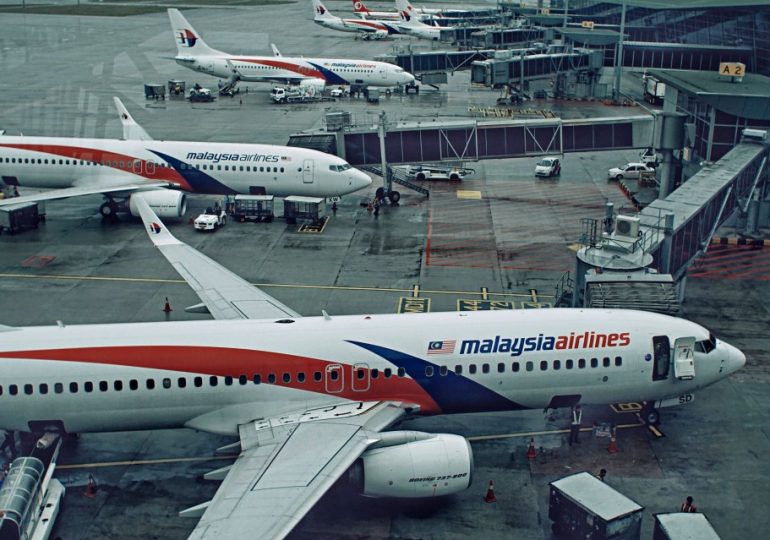LEADING experts have uncovered a new search site for the doomed flight MH370 which they claim could finally solve the nine-year mystery.
MH370 was travelling from Kuala Lumpur in Malaysia to China‘s capital Beijing when it lost contact and disappeared in March 2014.
GettyThe Malaysia Airlines plane disappeared nine years ago and despite extensive searches, has never been found[/caption]
National GeographicA snapshot from a documentary on MH370 showing the plane crashing into the ocean[/caption]
ReutersPolice inspect a piece of plane debris found on the beach in Saint-Andre, on the French Indian Ocean island of La Reunion[/caption]
Despite countless attempts to trawl different stretches of the ocean for the plane, it has never been found and the fate of the 239 onboard remains unknown.
In September, pilot Patrick Blelly and aerospace expert Jean-Luc Marchand said a new area could be searched in just ten days.
Marchand said: “We have done our homework. We have a proposal … the area is small and considering new capabilities it will take 10 days.”
“It could be a quick thing. Until the wreck of MH370 is found, nobody knows (what happened). But, this is a plausible trajectory.”
Marchand and Blelly’s new theory, prompting the search, is that the plane was deliberately hijacked by an experienced pilot before it plummeted into the ocean.
“We think, and the study that we’ve done has shown us, that the hijacking was probably performed by an experienced pilot,” Marchand claimed.
“The cabin was depressurised … and it was a soft control ditching to produce minimal debris. It was performed as to not be trapped or found.
“Certainly, the aircraft was not visible except for military. The guy knew that if search and rescue would be triggered it would be on the flight path.”
The pair provided evidence to support previous theories they’ve put forward that the plane’s communication and tracking systems were turned off and the pilot did a U-turn on the flight path.
They specifically said it changed direction in between Thai, Indonesian, Indian, and Malay airspace – sort of “no man’s land” of tracking.
Marchand said: “What would have been the intention of the hijackers? This is a very sensitive area. You have Thai, south Indian radar coverage, but they don’t care.
“You have reached the war range, but also the radar, so this zone here is in no man’s land. No control, no visibility for Kuala Lumpur. So, the guy can do whatever he wants.”
Malaysia Airlines Flight MH370 took off from Kuala Lumpur and was heading to Beijing with 239 people on board and never reached its destination.
At 12.14am on March 8, 2014, Malaysia Airlines lost contact with MH370 close to Phuket island in the Strait of Malacca.
Before that, Malaysian authorities believe the last words heard from the plane, from either the pilot Zaharie Ahmad Shah or co-pilot, was “Good night Malaysian three seven zero”.
Early theories focused on the idea that the plane had flown north into central Asia.
Although this idea has been discredited it had some validity at the time due to the course military radar was tracking it on.
The possibility of a northern landing was refuted by satellite company Inmarsat which owned the satellite which had been tracking it.
The idea was further discredited when parts of the plane washed up off the coast of Africa.
The conclusion by most that the plane crashed somewhere near western Australia suggests there was some sort of malfunction before the plane crashed, causing it to change direction in an attempt to find somewhere to land.
The accident then caused a “mass hypoxia event” – a sudden loss of oxygen – which knocked out the crew and passengers before they could land.
The plane would then continue on autopilot until it ran out of fuel.
This theory is favoured by the Malaysian government and the Australian Transport Safety Bureau (ATSB).
But former French Air Force air traffic controller, Gilles Diharce, previously spoke exclusively to The Sun Online about a deliberate plot to down the plane and how he thought the spot where it landed was never searched.
Gilles worked on a study with Blelly and Marchand that suggested the pilot could have been attempting a “soft ditching”, a controlled emergency landing, as the flight headed for the ocean.
The theory went against official reports that point to a high-speed “death spiral” crash in a spot known as the Seventh Arc.
The pilot could have also turned on the plane’s backup power system to regain control of the aircraft when both engines failed due to fuel exhaustion.
It would explain why the plane’s communication system suddenly turned on and tried to connect to the satellite system, Inmarsat.
The report suggests the pilot then landed the plane in a controlled glide – but that this did not go as planned and the choppy waters caused the aircraft to split into two or three parts.
Gilles believes the glide could have been a deliberate attempt to sink the wreckage with as little debris as possible.
He said: “Why would a person want to fly the aircraft into the middle of the Indian Ocean?
“It’s possible the person who controlled the aircraft didn’t want anyone to find the plane in the future. To disappear without a trace.”
The report suggests the plane glided into the ocean instead of the “death spiral” suggested in official reports after the left engine “flamed out”.
With only one engine still functioning the plane’s rudder would have been used to keep the aircraft straight to stop it from spinning in a high-speed crash.
He also believed that this theory meant the plane could have crashed in an unsearched area of the South Indian Ocean – and Blelly and Marchand carved out a new search area consistent with his theories.
There are numerous wild conspiracy theories but most centre on Captain Zaharie deliberately crashing the plane, or as part of some bizarre murder-suicide idea.
Another expert Richard Godfrey believes the pilot feared he was being followed so flew the jet in circles, before landing the aircraft at high speed to help make sure it was lost forever.
And most recently an Australian fisherman claimed to have recovered the wing of a huge jet just months after MH370 disappeared, potentially pointing to another new crash site.
Leave a comment
















